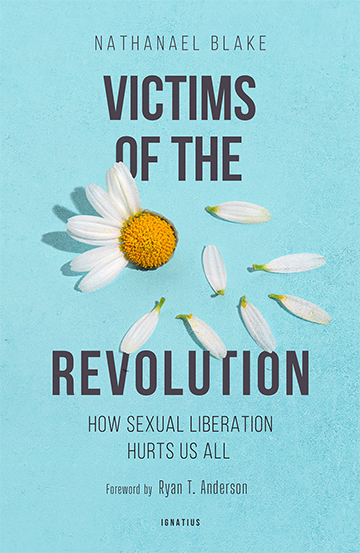
Many books and essays have looked at the many cultural, social, and historical aspects of the Sexual Revolution. But few have delved into the destruction and suffering caused by that revolution, and have provided a careful, direct, and caring Christian response to the pain and misery all around us now, decades later. Nathanael Blake’s new book Victims of the Revolution: How Sexual Liberation Hurts Us All (Ignatius Press, 2025) does exactly that, with a combination of scholarship, wisdom, and authentic Christ-centered compassion.
Blake is a Fellow at the Ethics and Public Policy Center in Washington, DC, and is a regular columnist for The Federalist, WORLD Opinions, Catholic World Report, and other publications. He received his doctorate from the Catholic University of America and resides in Virginia with his wife and children.
He corresponded recently with me about his book, which he first told me about when he visited me at my home in Oregon in December 2022.
Olson: What is your book about, and why did you write it?
Nathanael Blake: The sexual revolution has broken its promises, inflicting misery and suffering rather than the pleasure and freedom it promised. As its evil effects become ever more undeniable, Christians can show a hurting world why our understanding of human persons and sexuality is the basis of a better way to live.
Olson: You write near the start that your “book is a social critique grounded in the Christian natural law tradition.” Can you unpack that a bit? And what might you say to potential readers who are not Christian or are dismissive of natural law?
Blake: Christianity teaches that there is a God-given moral order in our nature, and that we can therefore know and articulate many moral truths despite our sin, even without divine revelation. These natural law truths direct us toward our well-being and flourishing, both individually and collectively.
The Christian natural law tradition was inaugurated by the Apostle Paul’s letter to the church in Rome, beginning with his description of sexual deviance as a defiance of the natural law inherent in God’s creation. Today, the Catholic Church has a well-known affinity for natural law theorizing, and Reformed theology has recently seen a revival of natural law thinking.
Thus, the Christian natural law tradition offers a way to diagnose what has gone wrong with our relational and sexual culture, and to explain it even to those who are not Christians. Those who reject Christianity are thereby confronted with the challenge of providing a more convincing account of human nature and moral truth, one that better explains what has gone wrong in our culture.
Olson: You state that the “new regime of sexual liberalism reigns almost unchallenged,” but that “it has failed on its own terms.” What are some of the characteristics of this reign—not just obvious ones but less obvious? How does your book provide ways to identify and challenge this regime?
Blake: Some aspects of sexual liberalism’s dominance are indeed obvious, such as the normalization of cohabitation and divorce, or the legal recognition of “same-sex marriage.”
However, sexual liberalism has also reshaped our culture in myriad more subtle ways, and so Christians need to consider the material and cultural factors that influence people’s sexual and relational decisions. For example, a culture of delayed marriage will make chastity more difficult, and fornication (followed by other evils, such as abortion) more alluring.
And yet many Christians accept or even encourage economic and educational approaches that strongly incentivize delaying marriage. But if we want young men and women to remain chaste, we should make it easier to get married and start a family sooner, rather than accepting a norm of marriage as something to only consider around 30 or later.
Christians who want to challenge sexual liberalism need to identify and address the material and cultural conditions that make it seem inevitable for so many people.
Olson: It has become common in some Christian circles to deride “the culture wars” and to insist they are of no value. What do you think of that position and approach?
Blake: Culture wars matter, and Christians should participate in them. Though there are portions of our culture wars that are trivial, or about which Christians may reasonably disagree, there are also fights over essential matters that it would be sinful to ignore.
Christians cannot be indifferent to whether it is legal to kill human beings in utero. We cannot write off the nature of marriage or the distinction between male and female. We should care very much whether our governments know the difference between good and evil.
Addressing these matters wisely will require prudence and charity, but that is not the same as quiescence. To fail to speak the truth on these matters, and to decline to vote and legislate according to the truth, is to fail to love our neighbors as ourselves and to care for their good in this life and that which is to come.
Olson: You refer to some secular critiques of the sexual revolution, but remark that “these authors are not radical enough.” What are the weaknesses in those approaches?
Blake: Three authors in particular (Mary Harrington, Louise Perry, and Christine Emba) have recently published books challenging elements of the sexual revolution. They all made some excellent points, especially about how sexual liberation has hurt women, but each of them stopped short of entirely rejecting the sexual revolution.
In particular, they did not want to criticize homosexuality, or to unequivocally condemn the evil of abortion, or to say that fornication is sinful. And they lacked a positive vision of what human sexuality should be rooted in. Emba (an evangelical turned Catholic convert turned lapsed Catholic) came closest, but she ended up offering a Thomistic approach that was so watered-down that it left almost the entire menu of sexual sin still available, so long as people were kinder and gentler about it.
Ultimately, these critiques of the sexual revolution failed to offer a compelling alternative that is grounded in a more accurate understanding of human nature and well-being. Articulating such an alternative is a large part of what I have tried to do in my book.
Olson: One of your key points is that the sexual revolution has failed, sometimes epically. What are some of those failures? And who are the victims—to reference the title of the book—of the revolution?
Blake: The sexual revolution promised freedom, happiness, authenticity, and—of course—more and better sex.
And yet Americans are lonelier and more likely to live alone than ever before. We have fewer children than we say we want, and fewer than we need to avoid the travails of an aging, declining population. Americans also report having less, and less satisfying, sex than prior generations. The dating and sexual landscapes are increasingly fraught and unhappy.
Sexual liberation did not keep its promises, and it has injured, even ended, many lives. There are the men and women alone and unhappy in a culture that taught them how to selfishly pursue short-term pleasure, but not how to build and sustain a committed relationship. There are the millions upon millions of tiny humans killed because their lives would have been inconvenient. There are the people, and especially the children, mutilating their bodies in the impossible quest to change sex.
Not everyone has been hurt so dramatically, but everyone has to contend with a culture that urges us toward sin and destruction, rather than righteousness and flourishing.
Olson: What are some of the ways that the revolution has harmed and even destroyed essential relationships? And how can that be addressed and changed?
Blake: The sexual revolution set out to abolish the restrictions, commitments, and duties that restrained sexual desire and indulgence. Romantic and sexual partnerships, including marriages, became dissolvable at will, and so, therefore, did parent-child relationships.
But the results have been immiserating, rather than liberating. This is because human happiness is not found by pursuing maximal sexual pleasure (which tends to be a self-defeating endeavor, anyway), but through deep, loving relationships that can only be developed and sustained with commitment. We are meant for love, and in this life most of us are called to experience our deepest loves through the vocations of marriage and parenthood, which unite the two halves of the human race in a union that continues it.
The Church must proclaim this truth, and believers must model it to a world that needs it amidst the desolation and loneliness wrought by the sexual revolution.
Olson: “America,” you write, “is broken because it is haunted.” How is our country haunted, and why is it broken?
Blake: Abortion is the violence inherent in the sexual revolution. For there to be consequence-free sex, the humans inconveniently conceived during sex (which is, after all, ordered toward begetting new people) have to be gotten rid of.
But this elimination of the unwanted consequences of sex has consequences of its own. Abortion hardens the hearts it doesn’t stop. It has distorted our law and politics. It responds to the asymmetric realities of human reproduction with selfish violence rather than solidarity, and it thereby encourages us to treat women as defective men whose natural fertility has to be bloodily suppressed. It has reshaped relationships, discouraging commitment and replacing the foundational love of the natural family of mother, father, and child with a lethal battleground of competing selfishness.
Olson: In just the past couple of decades, we went from what I call the “Reign of Gay” to the “Tyranny of Trans.” What are the logical connections between the two? And what do you make of those who are “gay” who are pushing back against trans ideology?
Blake: The gay-rights movement insisted that male and female do not matter, except as objects of personal sexual preference. And if there is no intrinsic significance or purpose to our embodiment as male and female, but only subjective desire, then there is no reason why the physical realities and social recognition of male and female should not be altered or ignored at will. After all, if male and female don’t matter in marriage and family, then they don’t matter anywhere. It is nonsensical to say that it doesn’t matter if a baby has an extra daddy and no mommy, but to then get up in arms about daddy trying to become mommy.
As a matter of practical politics, we should gratefully welcome the aid of allies in the fight against gender ideology. But we must not stop proclaiming the truth about men and women in order to placate any allies, and especially those of convenience. Instead, we should challenge them—if they don’t like our account of what it is to be human, and the significance of our embodiment as male and female in marriage and sexuality—to come up with their own, superior account.
Olson: Why are so many “straight” people supportive—often fanatically—of transgenderism and “being queer”? How can this irrationality be countered and addressed?
Blake: First, the cultural pressures are significant, and the personal pressure is often even more intense—many people who identify as LGBT will threaten suicide if not affirmed, or they’ll cut off contact with friends and family who do not approve of their behavior.
Second, those who have embraced the sexual revolution in their own lives will often struggle to condemn its next steps. LGB set the stage for the T, and decades of increasing acceptance for divorce and fornication prepared the way for the LGB.
When it comes to the sexual revolution, the slippery slope has proven more prophetic than fallacious, and the slide down will not be stopped by looking for a firm foothold halfway down. Instead, what we need now is to articulate and model a Christian alternative that is rooted in the truth about our nature as men and women, what our sexuality is meant for, and how we are to flourish in the family vocations most of us are called to.
Olson: The early Christians, you note, led a sexual revolution in the first centuries of the Church. What lessons can be learned from their approach and example? How do Christians best revolt against the current secular orthodoxies and build a culture of chastity, life, and authentic love?
Blake: Christianity cared for and protected the victims of a pagan sexual culture that regarded many people—including slaves, prostitutes, and unwanted babies—as disposable in the pursuit of sexual pleasure. Amidst an exploitative culture, Christianity offered both eschatological hope and a model for a better way to live in this world.
This is still what Christianity offers. As the evils and false promises of sexual liberation become more apparent, Christian sexual morality may once again be seen not as a scolding killjoy but instead as a guardian of human well-being in this world and a guidepost directing us toward our fulfillment in the world to come, when the Church is united to Christ.
Olson: Any final thoughts?
Blake: The sexual revolution is undermined by its own triumph. The more it conquers, the more apparent its evils become, and the more opportunity Christians have to show that there is a better way to live.
(Editor’s note: This interview was published originally on the “What We Need Now” site and is republished here with kind permission.)
If you value the news and views Catholic World Report provides, please consider donating to support our efforts. Your contribution will help us continue to make CWR available to all readers worldwide for free, without a subscription. Thank you for your generosity!
Click here for more information on donating to CWR. Click here to sign up for our newsletter.









